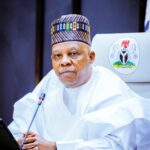The new year will undoubtedly produce many points of interest and issues that will attract global attention in Africa, especially in the West African sub-region where the democratic impulse will face some of the most severe tests of its resilience in the continent so far.
It is most likely that Nigeria’s General Election and presidential contest that will take place in February will provide an intriguing subject of interest for observers of the African polity as well as for serious analysts of African politics. However, when that event is over, one of the most interesting and important issues arising in that area of concern will evolve from the advent of the elections that are due to take place in Sierra Leone in June.
The circumstances that will make the Sierra Leone event attract global interest are particularly unique as the advent of the incumbent government arose from historical factors that are peculiar to that country. Sierra Leone’s civil war is widely regarded to have been one of the most brutal and horrific conflicts ever waged in the continent and the resultant breakdown of public trust that characterises communal relationships in that country is considered to be an important element of consideration about public acceptability of the electoral culture of the nation. The fact that members of Sierra Leone’s populace were provoked to display elements of disenchantment during the tenure of the incumbent government is one of the reasons why the elections taking place in the new year will attract special interest.
The President of Sierra Leone, Dr Julius Maada Bio, might well be considered to be himself a symbol of the ideals of democratic choice since when he was a young military officer, he led a coup that turned out to have as its eventual purpose the restoration of representative government in the nation. However, when he won the election into office in 2018, it was after a hard fought contest that has been described as one of the continent’s most competitive such races. The fact that he led the country’s oldest political party, the Sierra Leone’s Peoples Party (SLPP), to oust the then incumbent All Peoples Congress (APC) gave him the cachet of historic achievement as representing a new generation of citizens who can place the country on the path to a new direction of leadership and development. He presented one of the longest inaugural addresses ever heard in the parliament in 2018 in which he espoused a number of initiatives especially in education that were unprecedented. Being the youngest person ever to be elected to lead the nation having been born after Sierra Leone gained independence in 1961, his concern for making governance serve the welfare of the vast majority of the populace who are even younger than him is understandable.
- PHOTOS: Moment Ronaldo landed in Saudi Arabia for Al Nassr deal
- Court dissolves 3-month-old marriage over food, orders wife to return ring
When a major breakdown of law and order occurred recently in parts of the country, the security forces quickly determined that the main motivation of the events was political provocation rather than genuine public disenchantment. When the dissent spilt onto the streets, President Bio was away in the United Kingdom, but he was very proactive and swift in responding to queries from international media over the issues that appeared to be disturbing the public. In an interview aired on the BBC, President Bio was remarkably empathetic in his sentiments when he agreed that the ordinary citizens were indeed facing very hard times. In the same conversation, he also agreed with his security operatives who insisted that the rival party had taken advantage of economic circumstances which could hardly be blamed on the incumbent administration to provoke political miscreants into creating public disturbances. Shortly after that crisis, an environmental disaster occurred when a major mudslide in a part of the capital Freetown destroyed scores of homes and left several hundred people displaced. Once again President Bio’s response was rapid and personalised as he visited the scene of the disaster within a few hours and announced emergency relief measures organised by the government in record time. As a result of these events, it might very well seem as if the SLPP’s New Direction Administration has been under pressure to improve the public welfare to a great extent even more than its predecessor. However, the challenge being mounted by rival political forces while difficult for the incumbent government to confront is susceptible to President Bio’s pledge to change the trajectory of governance from a system of privileged reward to one of public service.
An important factor in domestic political organisation that has emerged since the SLPP victory at the polls in 2018 is the fact that some senior members of the government, notably the Speaker of the parliament, Right Honourable Dr Abbas Bundu, emerged from a region that used to be considered the stronghold of the opposition APC. Dr Bundu’s service as one of the most innovative executive secretaries of ECOWAS and one time Foreign Minister of the country makes him definitely an icon of the battle for representative government in the entire sub-region. He is an important figure in any study of West Africa’s democratic impulses and so in the run-up to the approaching electoral contest, the record of collaboration between the executive and legislature in Sierra Leone since 2018 will play a large part in determining the outcome and the nature of the results both for the country’s electorate and for interested global observers. It is imperative that the election processes in any country should be seen to be credible and relevant to the populace whether the country is regarded as being complex in its diversity like Nigeria or less complex but no less challenged by its history like Sierra Leone. For this reason, Sierra Leone’s exercise in testing the resilience of the system and the public comprehension and assessment of the government’s performance since the last election will be of vital importance in any attempt to judge the validity of West Africa’s democratic imperative in the new year.
Baratte wrote from Abuja

 Join Daily Trust WhatsApp Community For Quick Access To News and Happenings Around You.
Join Daily Trust WhatsApp Community For Quick Access To News and Happenings Around You.


